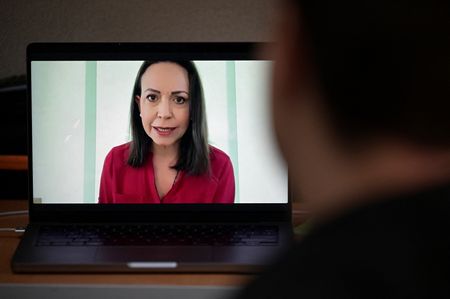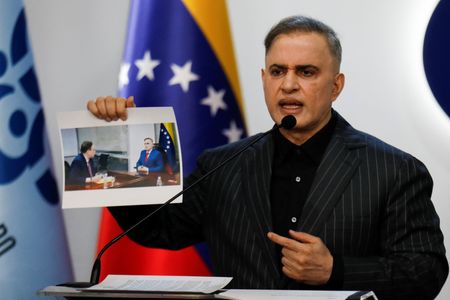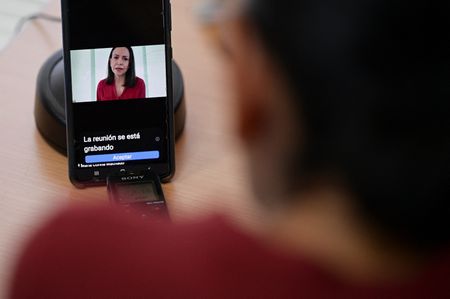By Julia Symmes Cobb and Vivian Sequera
BOGOTA/CARACAS (Reuters) -Venezuela opposition leader Maria Corina Machado said on Thursday she wants the United States to do “much more” to press President Nicolas Maduro amid an ongoing dispute over July’s presidential election.
Democracies around the world have criticized the Venezuelan government’s handling of the July 28 vote, which election officials and its top court say was won by Maduro, who has been in power since 2013. Authorities have not released full tallies, blaming a cyber attack.
But ballot box-level tallies posted by the opposition show a resounding victory for its coalition candidate Edmundo Gonzalez. Election observers, including the Carter Center and a United Nations panel of experts, have said the vote was unfair.
By way of an initial punitive measure, the United States had drafted a list of around 60 Venezuelan government officials and their family members who could face sanctions and U.S. visa bans, sources told Reuters last month.
But it has not yet taken action.
U.S. officials have since been narrowing down the names of potential targets, which could include members of Venezuela’s electoral council, senior judges, lawmakers, and security and intelligence commanders, according to two people familiar with the matter. The timing of any measures remains unclear.
Venezuelan officials – including Maduro and many in his inner circle – and its key oil industry are already subject to wide sanctions by both the U.S. and the European Union.
“I certainly think the United States should do much more and I have been very clear to them and to other countries,” Machado told an online press conference on Thursday, adding that there were international mechanisms to punish those who violate human rights.
“We are considering a range of options to demonstrate to Maduro and his representatives that their misgovernance in Venezuela has consequences,” a State Department spokesperson said, adding they had nothing to announce at this time.
The White House did not immediately answer Reuters questions about Machado’s remarks.
An end to the Maduro era would also be to the advantage of international investors and creditors, Machado said.
Estimates of how much Venezuela owes creditors vary from $60 billion to $150 billion.
“Companies should understand that it is in their best interest, as well as Venezuela’s creditors, for a transition to proceed as fast as possible, and to not support the regime,” Machado said.
U.S. oil producer Chevron received a license from the Treasury Department in 2022 allowing it to expand oil output in Venezuela and resume crude exports to the United States.
Since last year, European companies including Repsol and Maurel & Prom have also received U.S. authorizations to expand businesses with state oil company PDVSA.
Chevron, Repsol and Maurel & Prom did not immediately reply to comment requests.
WARRANTS AND WORRY
At least two dozen people died at post-election protests and several major opposition figures have been detained.
Maduro’s government calls the opposition a fascist movement allied with imperialist forces abroad and blames it for the protest deaths. Opponents and human rights groups accuse the government of carrying out a campaign of repression.
Brazil and Colombia, whose leaders have traditionally had friendlier relations with Maduro, expressed profound concern this week over an arrest warrant issued for Gonzalez, which followed weeks of comments from Venezuelan government officials that Gonzalez, Machado and other members of the opposition should be jailed.
Brazilian foreign policy adviser Celso Amorim called it “an authoritarian escalation,” while Colombia’s foreign minister said the presidents of Colombia, Brazil and Mexico may hold a call with Maduro to express their position. The call has not yet taken place.
Gonzalez’s lawyer Jose Vicente Haro met with Attorney General Tarek Saab on Wednesday to hand in an affidavit outlining why he and Gonzalez believe Gonzalez violated no laws and why the erstwhile candidate did not attend three summons to testify about the opposition’s vote tally website.
Saab told journalists on Thursday that the document was “inappropriate” and that the warrant for Gonzalez, 75, remained valid.
Saab’s comments showed that Gonzalez “does not have any constitutional guarantees,” Haro said.
“The attorney general has practically convicted him, he hasn’t just attributed crimes to him, but convicted him of things for which he has no responsibility,” Haro said. “He wants to put him in a situation of privation of liberty … to then deny his rights.”
Venezuelan law does not allow those over 70 to serve sentences in jails, instead requiring house arrest.
Asked about a U.S. sailor detained in Venezuela, Saab said the sailor had a Mexican passport and had entered the country without any documentation or justification.
(Reporting by Julia Symmes Cobb in Bogota and Vivian Sequera in Caracas, additional reporting by Carlos Ramirez in Caracas, Marianna Parraga in Houston and Matt Spetalnick in Washington; Editing by Rosalba O’Brien)












